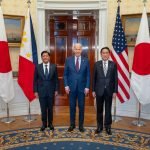After a confused post-holiday week marked by conflicting statements and signals from key Greek leaders in the ruling coalition government, political developments in Athens switched back into high gear immediately after the Macedonia/FYROM parliament approved constitutional amendments required by the Prespes Agreement late on January 11, which change the country’s name for all purposes to “North Macedonia.”
In reaction, Greece’s Defence Minister Panos Kammenos resigned early January 13 and a vote of confidence in the remaining SYRIZA government is expected to be announced shortly.
Strong Western support for Zaev’s efforts
The baffling week that followed the New Year and Orthodox Christmas holiday was marked by conflicting statements and signals from key Greek political figures as developments in Greece moved into high gear immediately after the Macedonia/FYROM Parliament approved the constitutional amendments required by the Prespes Agreement.
These highly controversial amendments required a two-thirds majority for passage, and the amendments were backed by 81 lawmakers in the 120-seat House.
As promised, the country’s main opposition party, VMRO-DPMNE, boycotted the vote, although a number of its now expelled members broke ranks to support the plans of Prime Minister Zoran Zaev’s government to take the country into NATO and the EU, assuming Greek objections are ultimately lifted and Athens ratifies the deal.
Western leaders immediately voiced strong public backing for Zaev, bombarding the Twittersphere with messages as they have throughout 2018. NATO Secretary-General Jens Stoltenberg and EU Enlargement Commissioner, Johannes Hahn – frequent visitors and now household names in Macedonia/FYROM – were the first to back the move, almost in real time, with Washington’s minimalist statement emerging a day later.
I congratulate PM @Zoran_Zaev on the parliament’s final vote on the #PrespaAgreement. #NATO strongly supports the full implementation of the agreement, which is an important contribution to a stable and prosperous region.
— Jens Stoltenberg (@jensstoltenberg) January 11, 2019
#PrespaAgreement: My sincerest congratulations to political actors +citizens of the hopefully soon to be #North–#Macedonia on Parliament’s vote on the constitutional changes! Hope that this historic decision creates a positive dynamics for #reconciliation in the whole #WBregion!
— Johannes Hahn (@JHahnEU) January 11, 2019
U.S. welcomes decision by #Macedonia’s Parliament to adopt constitutional amendments needed to ratify the Prespa Agreement with Greece. Statement by @SecPompeo: "The U.S. sees this as a historic opportunity to advance stability, security, and prosperity." https://t.co/oz51ZrFDUy
— Department of State (@StateDept) January 12, 2019
Greek developments – wheels within wheels
The coalition government of SYRIZA and the Independent Greeks (ANEL) party, in power since January 2015, had been widely expected to fracture over the parliamentary ratification process for the Prespes Agreement.
The left-right governing coalition held an almost impossibly thin majority of 153 seats in the 300-member parliament, with seven of those seats allocated to the ANEL party which is expected to disappear in the next Greek elections that must be held sometime before October. Polls indicate it will probably fail to obtain the minimum three percent of the popular vote needed to meet the Greek parliamentary election threshold.
ANEL leader Kammenos has long promised to reject the Prespes Agreement but several of his MPs have said publicly they will support it, generating new internal break-up scenarios each day.
Prime Minister Alexis Tsipras continues to declare his belief that the deal will be ratified with the support of a few centre-left and independent lawmakers, filling in for the loss of ANEL support. Tsipras has consistently rejected proposals made earlier this year by Kammenos and others for a Greek referendum on the deal, as was held in Macedonia/FYROM, or for the need for an enhanced majority of 180 MPs for passage.
The main opposition New Democracy party, widely favoured to win the next elections whenever they are held this year, has said it will block the deal which it faults over its treatment of the “Macedonian” nationality question.
This is something New Democracy notes no Greek prime minister except Tsipras would ever agree to – chiefly to leave a legacy of having “accomplished something” since his economic policies have cost him considerable support in an election year. At this point, unless early elections are called, New Democracy’s only option has been to request a no-confidence vote in parliament, something that was tried and failed last year.
Bloodletting in Athens begins
The first casualty in Athens is Kammenos, who, after meeting with Tsipras January 13, said “The Macedonia name issue… doesn’t allow me not to sacrifice the minister’s chair”.
But in an unexpectedly bold move aimed at salvaging his own political career, Kammenos stated he would also withdraw six other ANEL party ministers, many of whom hold deputy minister posts, from their current coalition government slots, but would not order them to vote his way in any no-confidence vote in the government. It is not clear how many will follow his orders and various head counts made by Greek journalists after the announcement indicate the majority of ANEL deputies could stay on, translating essentially into the absorption of a large chunk of ANEL by Tsipras’ SYRIZA government.
In a press conference later that same day, Kammenos provocatively stated that he would vote against his former SYRIZA allies if they moved to ratify the Prespes Agreement. He was also highly critical of the non-democratic tactics PM Zaev had used in Skopje for the last several months to get the 81 votes required to pass the constitutional amendments. He explained that he had requested Tsipras to take the Prespes deal to the Greek people in a referendum, a proposal which got nowhere.
Tsipras briefly addressed the press just after noon Sunday, announcing he is invoking the established procedure for an immediate vote of confidence in his government in Greece’s parliament in order to continue the government’s term to the fall of 2019, and that he would be asking Greece’s current Chief of Defence, Admiral Evangelos Apostolakis to step in as Defence Minister.







